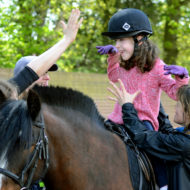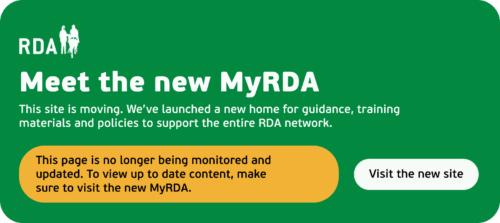Online Order Form now available!
A quicker and more readily available alternative to the paper order form is now available! Groups and Approved Centres can now place orders for ASDAN workbooks via the new online form. You can of course still use the paper order forms and can contact the office with questions or queries about ordering ASDAN workbooks but we wanted to offer an alternative method that also fits in around the working day.
The new form is available in the green bar on the left underneath ‘Education & ASDAN’ or by following this link: ASDAN Order Form.
Learning through horses...learning for life!
RDA activities offer a great platform for learning , both for participants and volunteers, in an environment that is supportive, engaging, rewarding…and fun!
Did you know that RDA Proficiency Tests (for Riding, Horse Care & Welfare, Carriage Driving, Showjumping and Vaulting), the Endeavour Award, the ASDAN programmes and even the RDA Arts and Crafts competition at the National Championships, all form part of the wide range of exciting and varied educational projects taking part within RDA Groups?
Whatever the scope of your Group, or the age and ability of your participants, you can become involved with education in RDA.
In this section, you can find all the information you need to deliver different Educational activities within your Group. Please see the proficiency test page for the training aids and revision worksheets, which are a useful resource for some participants doing ASDAN.
Proficiency Tests (myrda.org.uk)
ASDAN in RDA
Asdan provides a way for learners to take part in a structured, nationally recognised award scheme. This complements RDA Proficiency Tests and other awards. It helps groups to provide appropriate challenge and progression for participants who have completed all the appropriate proficiency awards. They also provide breadth where progress to higher grades is not appropriate. Awards can be achieved with a range of support levels, from ‘No help’, through to ‘Experience Recorded’, allowing everyone, whatever their level of ability to take part and achieve recognition. The awards provide structure for groups to offer a package to schools or local authorities, or those who are home-schooled. Clear goals can be set and the development of skills can be demonstrated with evidence.
There is no one approach which fits all participants. Support is provided by RDA National Office for those starting out and in time we hope to build up a bigger library of resources.
Towards Independence
Towards Independence provides a framework of activities to develop and accredit personal, social, work-related, and independent living skills. Towards Independence offers formal recognition for small steps of achievement towards a larger goal. There are more than 70 modules, which can be used separately and accumulated to build a record of personal achievement. Within RDA, we focus on Animal Care, although some groups do Work Awareness or other modules.
Towards Independence Animal Care
Activities in this Towards Independence module are divided into the following sections:
- Choosing a pet
- Housing
- Feeding and health care
- Keeping the animal clean
- Grooming
- Exercise and play
- Animal and handler safety
- Training
- Holiday care
- Clothes and equipment
- Horse grooming
- Knowing parts of the tack
- Riding skills
- Post-riding skills
- Project
Sections 10 to 15 are related to horse riding and stable management. Participants do a minimum of 6 sections to achieve the award.
Towards Independence Work awareness
Activities in this Towards Independence module are divided into the following sections:
Working world; Workplaces; Health and safety; Work-related activities; Personal plan; Project
Animal Care Short Course
The Animal Care Short Course can accredit between 10 and 60 hours of learners’ activities and involvement in caring for all types of animals. This could range from looking after domestic pets at home, to working with farm animals and wildlife in the community, to finding out about more exotic species at zoos and wildlife centres. The flexibility of ASDAN’s Short Courses means they can be carried out in a variety of settings, over a time period to suit the individual or co-ordinating centre. Challenge descriptions can be interpreted and adapted according to the situation.
Learners must present evidence of their activities in an organised portfolio or e-portfolio.
This will contain:
- a record of challenges completed, with supporting evidence for each challenge
- recording documents, showing how learners have planned and reviewed their activities
- summary of achievement, highlighting skills development
- personal statement
The Short Course is split into seven modules, each containing activities based around a different aspect of animal care:
- Animal investigation
- Safety around animals
- Looking after animals
- Animals in trouble
- Animals in the media
- Animals and the law
- Careers in working with animals
Transition Challenge
Transition Challenge offers a learner-centred, activity-based curriculum that can be undertaken with as much support as necessary. It has been developed for learners aged 14–16 with SEND, although it can be used with older age groups if appropriate. This can provide a whole year’s worth of activities if all modules are done. This is ideally suited for participants who are with you for more than an hour each week, for example on an alternative education placement. A certificate can be awarded for individual modules, for those who spend less time with the group or have to cut their time short.
There are two levels available:
- Sensory: this programme offers a developmental perspective for learners with PMLD and rewards very small steps of learning and achievement
- Introduction and Progression: the activities in this programme cover the statutory programmes of study for the Key Stage 4 National Curriculum, along with activities to develop the skills required for adult living
All the activities can be carried out in the RDA setting and groups have been really creative. It is always possible to adapt the challenges e.g. for carriage driving or if you have other animals on site.
For information about ASDAN, please contact the Coaching Team.


